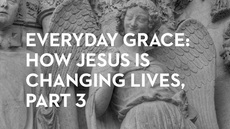What are Satan’s schemes against us?
Regarding spiritual warfare as it is experienced on the personal level, 2 Corinthians 2:11 (NIV) says, “Satan might not outwit us. For we are not unaware of his schemes.” Therefore, in addition to understanding his day-to-day tactics, understanding several overarching schemes employed by Satan and his servants helps us in anticipating his work and living in victory rather than as victims.
Scheme 1: the world
The world is our external enemy that tempts us to sin against God. What is meant by the term world in its negative sense? The world is an organized system in opposition and rebellion against God. In 1 John 2:16, the world is defined as corporate flesh working together in three ways. (1) The world is the domain of the desires or lust of the flesh, which is the sinful longings for physical pleasures that tempt us, everything from gluttony to drunkenness, sexual sin, and chemical highs. (2) The world is the place devoted to the desires or lust of the eyes, where the sinful longings for coveted possessions are manifested in everything from advertising and marketing to pornography. (3) The world is where pride in possessions is commended, and haughty, selfish ambition is considered a virtue rather than a vice.
In response to the world, the Bible commands a threefold response. (1) We are not to love the world. Because the world is our mission field, rather than our home, and the source of our temptation to sin, we must continually guard ourselves from falling in love with the world and the passions and pleasures it offers—not unlike the forbidden fruit that tempted our first parents. (2) We are not to let the world shape our values. Because the world is where Satan and our sinful desires converge, if we allow the world to shape our value system and define who we are, why we exist, what we believe, and how we behave, then we will be converted by the world rather than seeking the conversion to the kingdom of God. (3) Because Jesus died to the world, we are commanded to live as crucified to the world. This means that we are either alive to the sin of the world and dead to God, or dead to the temptation of the world and alive to God. By being dead to the world, we can live in true freedom from it and thereby enter into it as a missionary, as Jesus did, seeking to see people saved from the world by the gospel.
Importantly, while the world is a source of sinful temptation, it does not abdicate sinners from their moral responsibility. Therefore, no matter what our enemy hangs on our proverbial hook to bait us, we must always put our internal flesh to death if we hope to avoid sin.
Scheme 2: the flesh
The flesh is our internal enemy and a seed of corruption that lingers in us until our glorification in resurrection following death. In brief, the flesh is our fallen internal resistance to obey God and put self-interests above God’s interests. In the Bible, flesh sometimes means a physical body, as when the Word became flesh. But the Bible does not locate our sin in our physicality as ancient and contemporary Gnostics do. The sinful deeds of the flesh come from every part of our person. Paul uses flesh to refer to our innate propensity to sin against God; he says that the flesh is the seat of our sinful passions, the realm of sinners, and the source of our evil desires.
The Bible commands Christians to respond to the flesh in three ways. (1) We are to recognize that we are no longer under the flesh’s bondage. Jesus’ death for our sin and his resurrection for our salvation give us a new nature and a new power from God the Holy Spirit that enables us to say no to our flesh and yes to God. (2) We are to walk in conscious submission to the Holy Spirit. Because the Holy Spirit is more powerful than our sinful desires, he alone can get us out of unholy sin and into holy worship. (3) We are to put to death, or what the Puritan John Owen called “mortify,” sinful desires. The opposite of mortifying sin includes excusing sin, tolerating sin, or merely wounding sin by attempting to manage it. Mortification is Holy Spirit-enabled conviction followed by repentance of sin, faith in God, worship of God, and perseverance in holiness so that sin remains dead and joy remains alive.
Scheme 3: the Devil
The Bible speaks of Satan’s work in what can commonly be understood as the ordinary demonic and the extraordinary demonic.
Ordinary demonic work entices us to sexual sin, marriage between Christians and non-Christians, false religion with false teaching about a false Jesus, unforgiving bitterness, foolishness and drunkenness, idle gossiping and busy-bodying, lying, idolatry, attacking our identity through false and condemning thoughts, demonic dreams and night terrors.
Extraordinary demonic work includes torment, physical injury, counterfeit miracles, accusation, death, and interaction with demons.
Can Christians be possessed by demons?
Many Christians wonder, and even worry, about whether someone can be demon possessed. For those who aren’t Christian, it’s possible through such things as occult involvement, witchcraft (including Wicca and non-Christian spiritual practices), drug and alcohol abuse, and habitual severe sin when practiced to an extreme measure, to be significantly influenced by evil forces.
However, when it comes to Christians, Dr. Gerry Breshears has helped me understand that whether or not a Christian can be demon possessed is a question many people answer too quickly. The problem is that the word possess has several meanings. According to the Merriam-Webster dictionary it can mean three things.
First, possess can mean “own” so that a Christian would essentially belong to Satan.
Second, possess can mean “dominate” so that a Christian would be controlled by Satan.
Third, possess can mean “influence” so that the life of a Christian would be marked by the influences of Satan.
So, obviously, what people mean when they use the word possessed matters very much when answering the question, “Can Christians be possessed by demons?”
In the first sense, the Devil never owns a Christian. We have been rescued from the dominion of darkness and transferred into the kingdom of the Son, Paul tells us in Colossians 1:13.
In the third sense, the Devil can influence a Christian. We are in warfare against the Enemy who seeks to steal and kill and destroy. Even Jesus was attacked by the Devil in this way according to Matthew 4:1–11 and Luke 4:1–13.
It is in the second sense of the word possessed where there is a lot of debate among Christians. Can demons dominate a Christian? While some teach that through personal sin, generational sin, or even curses, demons can have authority to dominate believers, Scripture is clear that Christians are never under the ruling authority of darkness. The Devil can never take authority over a Christian. Others teach that if we pray and feast on God’s Word we never need fear a demonic attack. But if Jesus can be attacked, how can we say we cannot?
We believe Christians may be deceived, accused, or tempted by Satan and that Christians at times do yield to those attacks—though they do not have to. If believers begin to respond wrongly in such situations, they may give demons influence in their lives. Apparently an evil spirit can empower, energize, encourage, and exploit a believer’s own sinful desires. Examples would include Peter and Ananias. As children of God, regenerated and indwelt by the Spirit, we are responsible to and empowered by God to resist Satan, and if we do resist, we need not suffer from his influence.
This is part five of Pastor Mark’s series about spiritual warfare. If you missed them, check out parts one, two, three, and four. Come back next week for part six.
*Portions of this blog post were adapted from Who Do You Think You Are? (2013, Thomas Nelson), by Mark Driscoll, Death By Love (2008, Crossway), by Mark Driscoll and Gerry Breshears, and Doctrine (2010, Crossway), by Mark Driscoll and Gerry Breshears.















